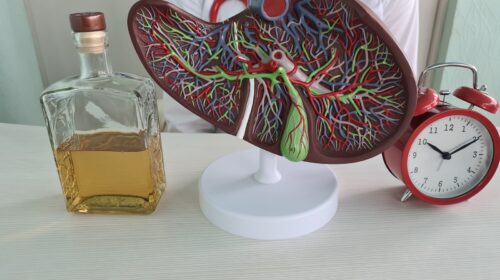Depression can be a serious and debilitating condition that not only affects how a person feels but can also impact their physical health. While there are some helpful medications to treat depression, such as Wellbutrin® , many people may be unaware of the potential side effects that can come with taking it.
While understanding potential Wellbutrin® withdrawal symptoms and timelines is important, the decision to use this medication should also involve consideration of its efficacy, potential side effects, individual health conditions, and consultation with a healthcare professional.
What is Wellbutrin® ?
Wellbutrin® is a medication used to treat depression and seasonal affective disorder (SAD) and help quit smoking. It is an antidepressant drug sold under the brand name Bupropion[1].
Wellbutrin® , unlike other antidepressants, falls under the aminoketones drug classification. This medication works by boosting the levels of dopamine and norepinephrine in the brain, two crucial neurotransmitters that regulate mood and energy levels.
Wellbutrin® is primarily used to treat major depressive disorder and seasonal affective disorder. While it may be used off-label for conditions such as ADHD, it is not typically used for anxiety or bipolar disorder. The effectiveness of Wellbutrin® varies from person to person, and it generally takes several weeks to see full results.
Wellbutrin® is a safe antidepressant choice, with lower risks for side effects than other antidepressants. Although side effects can occur, typical side effects such as dry mouth, constipation, and insomnia are generally mild and manageable. Regular blood pressure monitoring is recommended when taking Wellbutrin® , as it may cause an increase in blood pressure.
Is Wellbutrin® Addictive?
Despite common misconceptions, Wellbutrin® does not cause addiction in the traditional sense. Unlike opioids or benzodiazepines, Wellbutrin® does not produce a euphoric high or create cravings.
However, it can lead to dependence when taken consistently over an extended period. Abruptly stopping Wellbutrin® may result in withdrawal symptoms like irritability, anxiety, agitation, and insomnia. It is essential to have a healthcare provider’s guidance when tapering off the medication gradually.
Signs and Symptoms of Wellbutrin® Withdrawal
If you are taking Wellbutrin® and considering ending your treatment, you must be aware of the potential withdrawal symptoms. While not everyone experiences withdrawal symptoms, those often report feeling uncomfortable and possibly even experiencing health issues.
Here are some common signs and symptoms of Wellbutrin® withdrawal[2] to be aware of:
Physical Symptoms
- Sweating
- Digestive problems
- insomnia
- Tremors
- Restless legs
- Numbness
Emotional Symptoms
- Anxiety
- Irritability
- Agitation
- Bouts of Anger
- Mood Swings
- Depression
It’s worth noting that these symptoms can vary in severity, depending on how long you’ve been taking Wellbutrin® , how much you take, and other individual factors. While the severity and duration of Wellbutrin® withdrawal symptoms can vary, they are typically mild and short-lived. Most people experience symptoms that last from a few days to a few weeks, with severe or prolonged symptoms being less common.
Wellbutrin® Withdrawal Timeline
To comprehend the duration of Wellbutrin® withdrawal symptoms, it’s crucial to consider the medication’s timeline. The timeline for Wellbutrin® withdrawal can vary, but symptoms usually start within 24 hours after the last dose and can last several weeks, depending on individual factors such as dosage and duration of use.
Here is what you may experience if you are discontinuing Wellbutrin® [3]:
Days 1-3
During drug withdrawal, you may experience mild symptoms like headaches, nausea, dizziness, and fatigue in the initial few days. However, these symptoms are easily manageable with over-the-counter pain relievers, proper rest, and hydration. Adequate hydration is crucial during this time as it helps flush the drug out of your system.
Days 4-7
By the fourth day of withdrawal, expect mood swings, irritability, anxiety, body aches, and chills. These symptoms can be challenging to manage and are more severe than those experienced during the first few days of withdrawal. You should seek guidance from a healthcare professional to explore management options.
Days 8-14
During the second week of withdrawal, you may have trouble sleeping and experience vivid dreams and increased depression. To combat insomnia, relax before bedtime, like reading a book, taking a warm bath, or practicing relaxation exercises. If your depression worsens, don’t delay seeking additional clinical interventions.
Days 15-28
By the third week of withdrawal, your symptoms should dramatically improve. But you may still struggle with lingering symptoms like fatigue, anxiety, and irritability. Your symptoms will gradually lessen as your body adapts to functioning without the drug.
After Day 28
After four weeks, most people should feel like their withdrawal symptoms have disappeared. Yet, some might experience prolonged withdrawal symptoms that can last several months. How someone recovers from Wellbutrin® withdrawal depends on the individual. It is essential to always work closely with a healthcare professional to ensure the safe management of your symptoms.
Treatment Options for Wellbutrin® Addiction
Don’t let withdrawal symptoms from Wellbutrin® stop your progress. Seeking professional treatment is critical to managing these symptoms and staying on track for a full recovery. With a range of treatment options tailored to your unique needs, you can successfully navigate any potential short-term discomfort experienced during detoxification.
Below are some treatment options you can explore:
Medically Assisted Detoxification
During a medically assisted detoxification process, a doctor or nurse will assess your withdrawal symptoms and provide medication to ease their intensity. This helps make the withdrawal process more comfortable and ensures that any underlying medical issues are addressed during treatment.
Residential Treatment
Inpatient or residential treatment can be beneficial for individuals with severe withdrawal symptoms or those who need a structured environment to manage their medication discontinuation. However, it is important to note that Wellbutrin® is not typically associated with severe addiction akin to substances like opioids or benzodiazepines. By isolating patients from triggers and stressors of the outside world, they can focus entirely on their recovery.
Patients participate in several therapy types, including individual, group, and cognitive-behavioral. This option for treatment is ideal for those who seek a clear path to recovery with maximum support at all times.
Outpatient Treatment
Outpatient treatment is the perfect solution for patients who require treatment without sacrificing their routine. Unlike inpatient care, it allows patients to attend therapy sessions and maintain their work and home commitments.
Although less intense than other therapy types, outpatient treatment provides patients with the necessary tools to recover. With personalized one-on-one therapy, group therapy, and behavioral modification therapy, patients receive quality care within their busy schedules.
Support Groups
Support groups are an excellent treatment option for individuals in recovery. They provide a safe place for individuals to share their experiences, connect with others, and receive peer support. For example, Narcotics Anonymous (NA) and Smart Recovery offer a welcoming environment where patients can learn coping strategies and techniques to help them stay sober.
Holistic Treatment
Holistic approaches to treatment can also be effective in Wellbutrin® addiction treatment. Holistic practices typically consider the patient’s mental, physical, and spiritual aspects. The treatment may include yoga, meditation, art therapy, and acupuncture.
Patients who respond well to these therapies may see improved mood, reduced anxiety, and better overall health.
Find More Information About Potential Side Effects and Withdrawal Symptoms of Prescription Drugs
To learn more about the withdrawal symptoms and side effects of their prescription drugs, check out these additional resources.


























